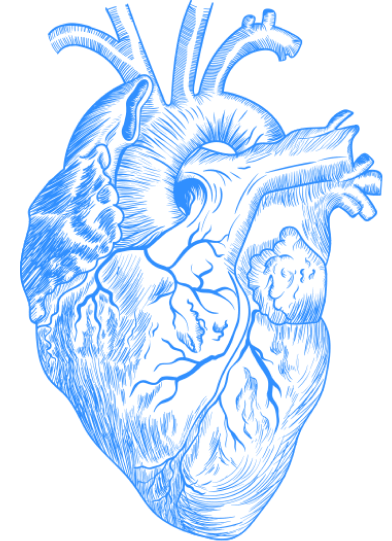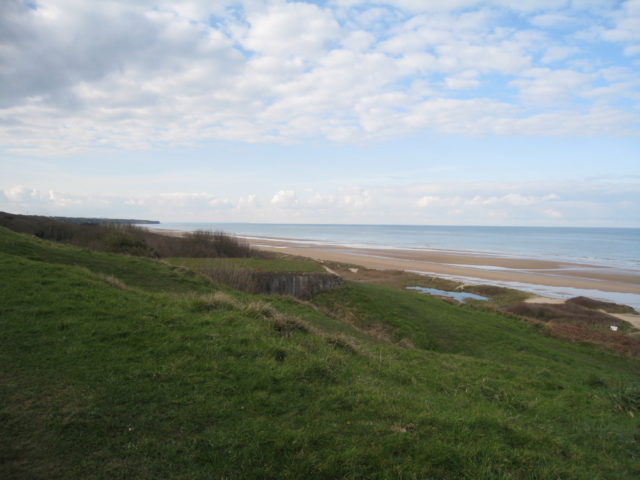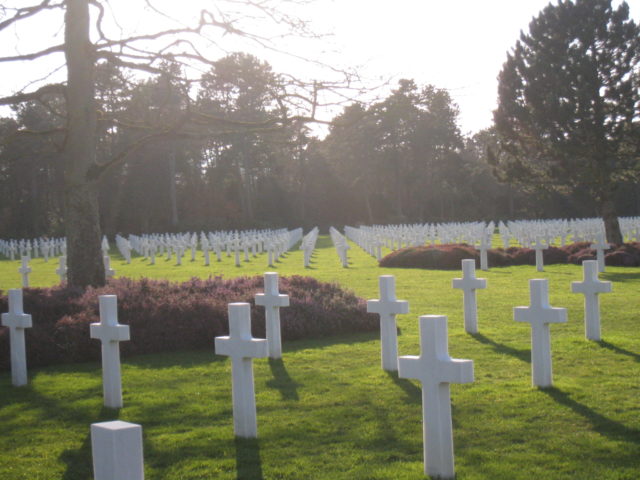

Photo: Aaron Rothstein
The effervescent rays of sunshine spread their warmth across my back as I walk along Omaha Beach in Normandy. French children kick around a soccer ball, shouting and giggling across a fifty-yard stretch of sand. A tranquil ocean extends into the horizon, effortlessly mingling with the sky making it impossible to tell where one starts and the other ends. Looking out across the serene water, I imagine June 6, 1944 and the chaos that once enveloped these beaches. The young American soldiers landing here faced an onslaught of bullets from Nazi pillboxes — concrete bunkers with holes to fire through — hidden safely in the hills.
That day alone, Americans suffered two thousand and four hundred casualties. As the bodies of young men washed ashore, the fortunate survivors endured gunshot wounds while crawling up the beach amidst the blood-soaked waves. One member of the 116th Infantry Regiment said: “They’re leaving us here to die like rats.” D-Day provides a chilling and indelible reminder of the terror of that war and its tragic necessity; of the noble and valorous sacrifice our young heroes made to rid the world of Nazi Germany.

Photo: Aaron Rothstein
I think of my trip to Omaha Beach as the 76th anniversary of D-Day approaches and I enter the hospital each morning during the Covid-19 pandemic. “Welcome healthcare heroes!” one sign reads outside an academic hospital. “Heroes enter here!” reads another. I walk in with a mask and use a squirt of Purell on my hands, as a nurse in a gown, face shield, and mask takes my temperature. If I’m afebrile I enter the hospital. A nurse standing at the entrance shouts “Thank you, heroes!” at approaching physicians and nurses. This is not restricted to hospital entrances. Toymaker Mattel created a #ThankYouHeroes toy line of nurses, physicians, EMTs, and delivery workers. Signs hanging outside of house windows read: “Thank you essential workers for your heroism!” The quarantined populace clangs pots and pans at 7 pm throughout the city streets in honor of essential workers. From cooks to janitors to doctors: all are now heroes in the public eye. This wellspring of gratitude is well-intended and appreciated. But are those of us who work in these jobs truly heroes?
In the mid-19th century, Thomas Carlyle, a British historian and writer, published a series of lectures in a book entitled On Heroes, Hero-worship and the Heroic in History. Though Carlyle offered some unusual theories about the role of heroes, we ought to consider the elements of his definition of a hero:
They were the leaders of men, these great ones; the modellers, patterns, and in a wide sense creators, of whatsoever the general mass of men contrived to do or to attain; all things that we see standing accomplished in the world are properly the outer material result, the practical realization and embodiment, of Thoughts that dwelt in the Great Men sent into the world: the soul of the whole world’s history, it may justly be considered, were the history of these.
A hero doesn’t just make a difference. A hero alters the trajectory of mankind, changes the soul of humanity, and, I think, takes a significant risk or makes a weighty sacrifice in the process. A hero is not a god but may seem god-like.
What about those who make a difference even if they’re not shaping the arc of history? True, there are many who, through their professions and their actions, perform moral and selfless deeds. But, as Carlyle explains, “We see men of all kinds of professed creeds attain to almost all degrees of worth or worthlessness under each or any of them.” A hero reaches even beyond such worth despite his or her imperfections.
Fortunately, there are plenty of examples throughout history of this, like the soldiers who stormed Normandy. Through their ultimate sacrifice they brought an end to Nazi genocide and sowed the seeds of freedom for millions of others. They suffered the cruel conditions at Omaha Beach and on other battlefronts to shape the world order for the better.
While physicians risk their lives during this pandemic, it is not quite the same. We come to work each day knowing that the day will end as we climb into bed, however far away from our families we are. For those of us with access to supplies, we don masks, gowns, and gloves to take care of patients with the virus and wash our hands before and after every encounter. As Dr. Greg Katz, a cardiologist in New York (and, full disclosure, my chief resident when I was an intern), writes,
After the first few weeks of the pandemic when I had a legitimate fear for my safety due to the PPE shortage, we’ve largely been able to protect ourselves working in the hospital….
When we suspect a patient may have COVID, they get a designation as a PUI, or person under investigation, and are kept in an isolated room. We only enter wearing full protective equipment – N95, gowns, gloves, head covering.
When we are in a COVID unit, the equipment is even more protective, where each physician has a PAPR along with supervised donning and doffing procedures.
Don’t get me wrong, it’s not a risk free endeavor, but health care workers who take adequate protections have a pretty low risk of getting sick.
While we make a dramatic difference in the lives of our Covid-19 patients, we are doing what we do every day, whether there is a contagion or not: helping patients as we swore to do when we entered the profession. This is not to say that there are not heroes among us. For instance, the late Dr. Lin Wenliang, a Chinese ophthalmologist who faced censorship from the Chinese government while risking his life and reputation to warn the world of the pandemic, is a hero. And yet, even while some physicians and nurses selflessly volunteer on Covid-19 units or in overwhelmed hospitals, a good number of us sometimes shirk our duties. In a piece for Quillette, Amy Eileen Hamm, a nurse, writes about how some doctors and nurses would rather not have to work.
To be sure, this is an exceptionally difficult time, even as tragic hospital work goes. Read the terrifying diaries of those working during this frightening contagion:
The evening before I’m due to return to the hospital, a colleague messages our group to say that a 49-year-old Covid patient of hers, who was waiting in the E.R. for an inpatient bed, was found blue and dead in a chair. Nobody even knows if he gasped before he died.
These stories echo throughout the daily news reports. Moreover, this virus takes a horrible, irreversible, and deadly toll on some of the doctors and nurses themselves, many of whom die or suffer from Covid-19. At least several thousand health care workers have been infected by the virus, and some dozens have died. Indeed, one mustn’t forget or dismiss the awful consequences and sacrifices of working in a hospital during this contagion, whether we call these workers heroes or not.
But it is confusing to call them heroes while hospitals and government bungle a response to the pandemic. For example, some physicians and nurses do lack the appropriate PPE to shield themselves from infections. This is not true at every institution, but it was prevalent enough at one time to endanger doctors and nursing staff. And if they protested against such shortages, as Dr. Ming Lin of PeaceHealth St. Joseph Medical Center found out in March, hospitals threatened or dismissed them. Other physicians, in the face of plummeting hospital revenue, face pay cuts of up to 40% as well as staffing shortages. In a survey one-fifth of physicians experienced pay cuts or were furloughed due to the economic tragedies of the pandemic. True, many institutions experience financial hardships. However, hailing physicians and nurses as heroes while making these cuts and threats does not change that reality as much as it reinforces it.
Ultimately, using the “hero” misnomer reveals an appreciation for those treating Covid-19 patients. But let us not confuse gratitude with near-deification. Doctors and nurses are humans, filled with cowardice and courage, both of which manifest in different ways. Physicians do not storm Omaha Beach in the face of gunfire. Nor is the soul of the whole world’s history the history of them. By obfuscating this, we needlessly amplify doctor’s and nurse’s deeds and diminish our own failures to aid society’s healers.
We should not call our physicians and nurses heroes, even if many of them act courageously. Nor should we call them by the anodyne and mundane name, “health care providers.” They are, perhaps, something in between.
